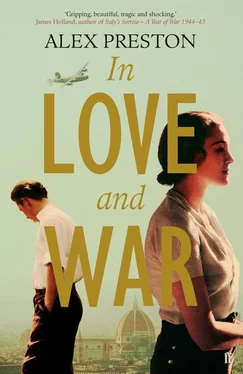That was last night. No great passion. We kissed, slept in the same bed, but not much more than that. We talked a great deal. She’s part of the Resistance, which strikes me as frightfully brave. It’s why she stayed in Florence when her parents left, to keep up her work here. Radio Firenze provides her with just enough of a cover story. I was stroking her hair as she told me this, her head in my lap. She’s involved in counterfeiting documents. She and the plump cashier, Maria Luigia, create the passports at night with the bank’s franking machine, official paper stolen by someone at the Ministry in Rome. Then Gino Bartali, with the alibi of his gruelling training, cycles out to safe houses. Hiding there are deserters from the Italian Army, Communists threatened with internment, Jews looking to forge authentic Italian identities for themselves before Il Duce carries out his threat to round them all up and deliver them to Hitler.
Just before I left, a few hours ago, as the first light broke over the city, she spoke to me in her glowing voice. She said this was why she’d been hesitant about us, why she’d backed off instead of doing what everything in her heart told her to do — to take me in her arms and kiss me. Because I was the enemy. And she needed to know that I was with her, that the decency she sensed in me wasn’t just a fabrication of love. I felt like Desdemona, you know: She loved me for the dangers I had passed, and I loved her that she did pity them. Ada’s bravery undoes me a little.
It’s coming up for six. I need a few hours’ sleep. Rustling, movement, happy familial sounds from the empty rooms tonight. Not uncanny now — comforting. Good night.’
10 . A-Side:Gerhard Wolf and Alessandro Pavolini discuss opera from Wagner to Puccini (33′ 54″)
B-Side:‘The picture we receive of the war, through Radio Londra, through the Empire Service, through the distorted lens of La Nazione, is muddled.
It is easy to think that propaganda only works in one direction, but, as Dr Johnson said, among the calamities of war may be justly numbered the diminution of the love of truth. We have no idea how things stand; all we can do is number the facts, the certainties, the casualties. Italy is at war with Greece, using Albania as a springboard into the Peloponnese. Germany and Britain continue to hack each other out of the skies above the Channel; those antediluvian Italian Fiats have joined the Messerschmitts in taking on the Hurricanes and Spitfires. Bombs rain down on the cities in squalls, exploding across Bristol, across Bonn, in strange symmetries which suggest fore-planning, complicity, consent. Liverpool’s getting it bad just at the moment. It was Hamburg last month. Under the dark waters of the Atlantic, the U-Boats prowl.
Ada and I spend several nights each week at the via dei Forbici. It feels provisional, unlikely: sometimes I catch sight of us in a shop window, or in the bathroom mirror at her apartment, and I think how odd we look as a couple. She’s twenty-six, three years older, but there’s something about her, perhaps also about me, that makes that distance seem much greater. She still gets the look occasionally, staring off as if I’m not there. It makes me feel as if any attempt to know her is doomed, but then she’ll smile, and never has a face changed so instantly, and she’ll place those sparrow-bone wrists around me and pull me in, and I have sudden, primordial charges. We’re happy together, or I am.
If it strikes you as strange, after Philip, after Gerald, that I should love Ada, it shouldn’t. It is not only that Fiamma, dear dead Fiamma, served as a copula, a springboard, a bridge. I have always loved beauty and the gender of those I love matters to me as little as their shoe size. It seems odd to me that so many humans limit themselves, slavishly. For now, it is Ada.
I realised that, since my last recording, since I spoke about Ada and her Resistance pals, I needed to be more careful with these discs. It didn’t strike me until a few days afterwards, walking through the Boboli Gardens on my way up to the Kaffeehaus to meet Ada. Unprompted by any sight or sound, I was gripped by a sudden certainty that someone was listening to the recordings I’d made. I raced back through the Oltrarno, scattering morning shoppers and their baskets, clattered upstairs and found the studio empty, naturally, the discs as I’d left them. But now I’ve eased up a floorboard, hidden them beneath it, scattered rugs.
One other revelation. I was in my room the other night. Ada won’t sleep at the church apartments, even though I’m certain Bailey wouldn’t mind, and is away so much anyway, and Goad is so absent-minded and frail he’d barely notice. But she won’t and so, two or three nights a week, I’m here alone. I was sitting up writing, going over passages of In Love and War, trying to dust some truth off the words. I scratched out whole pages in my notebook, wrote and rewrote, and it was as though I was unbricking a wall behind which bodies had been buried. Fascist blood was burning, burning in the veins of the novel and I would have no truck with it.
A sound brought me from the contemplative fug into which I’d fallen. It was past midnight — the bell of Santo Spirito had stopped and wouldn’t be back until five. I crept out into the corridor. It was cold and I had a thick woollen dressing gown wrapped around me, heavy slippers on my feet. Dim light coming up from the stairwell at the end. I felt my way along the passage, down the steps and round towards the entrance of the church. There, a flicker of light. I made my way into the church. Faint incense from Sunday’s service. In a pew at the front, looking up at the triptych, sat a young boy. He was humming quietly to himself. A candle in his hand. I walked down the aisle, looking at the soft black hair of his head. A creak of the floorboard and he turned round and there was horror on his face, and his eyes darted first one way, then another, searching for a way out. I got down on my knees, held up my hands, said something minor. He looked at me out of large, dark eyes. I asked him whether he liked the painting. We stared at it together. He didn’t answer, but his mouth dropped open a little.
I went to sit beside him. He must have been six, a scrawny scrap of a thing. He was wearing a jumper but his feet were bare. Sono Dino, he said, his eyes still fixed on the triptych. I asked him if he wasn’t cold. Un poco , he said, but he couldn’t find his socks in the darkness. I asked him where he lived and now he looked at me. Are you a Fascist? he asked. I shook my head. We’re upstairs, he said. I took his feet in my hands and rubbed them warm. We sat, his feet in my lap, for a while longer, staring up at the painting. It is bewitching, that triptych, something in it that shuts out the world. I felt suddenly sleepy, found myself nodding. When I woke, the boy was gone, the candles on the altar burnt down, the air around me still and grave.
Bailey was away on one of his trips and didn’t come back until late Saturday night, yesterday. He has lost weight: everyone is leaning on him at the moment — the Gladyses, Goad, certain other eccentric Brits who’ve decided to stay. He’s been enlisted by Cardinal Elia della Costa, the Archbishop of Florence, to advise a group of priests charged with interceding with the regime on behalf of political prisoners. The islands in the south, the blighted villages of exile, now busy with dissidents.
I always half-thought George Keppel’s description of Bailey as a spy was far-fetched, but the trips to Milan, to Switzerland, shuttling back and forth to Britain — it makes no sense for a priest. When he walked in that Saturday evening, I poured him a glass of wine and waited for him to sit at the table, where the map of the world has become a record of long dinners and twilit debate. The tanks and miniature soldiers with which he marked out the course of the war are all piled around North Africa, where he’d finally given up, overcome by military complexities, contradictory news. Military fronts, he said, sitting down heavily and unlacing his boots, were as wild and arbitrary as the weather from which they drew their name. I’d kept some pasta al ragù on the stove which I heated up and served to him. He ate in silence and I could tell he was waiting for me to speak. I told him about the boy.
Читать дальше












